Ok. Maybe that title is a little overstated, but I think there’s some truth to it.
Social media has definitely ruined free content when it comes to educating coaches to be better coaches on the training floor. Which is my bread and butter.
Consuming free blog posts and videos were a huge part of my weekly coaching routine when I first got into the industry.
I’d print out monster articles that were 5–15 pages long from people like Mike Robertson and Lance Goyke. I’d spend hours highlighting and taking notes, figuring out how I was going to apply the information I had just learned.
In my earlier years in the industry, I felt like I was CONSTANTLY learning. However, my version of always taking in new information is different than how coaches are educating themselves these days.
When I first got started, I was going to 2–3 seminars a year, buying 1–2 new products, and digesting 1–3 long articles a week from credible blogs.
The primary form of learning for coaches in today’s society is by consistently being glued to social media, jumping from one webinar to another, and joining every mentoring group that is launched but not actually participating.
Everyone is just trying to keep up with everyone else on social media #alwayslearning.
Because of social media, anyone can have a platform and produce content.
The route to becoming a reliable source in our industry has begun to be dictated by how many followers you have rather than having an already credible source find you worthy enough to be a guest on their platform.
Even the most credible sources now seek people based on their social media popularity instead of their expertise because they understand how this shit works. People will talk trash about other well-known sources but still invite them on their podcast or blog because they have 50K followers. Ew. No, thank you.
Social media content is not useful for educational coaching content.
In 2020, I started doing more one-on-one and group mentoring sessions, which opened my eyes to the impact social media content was truly having on coaches and clinicians.
It ultimately made me reflect on my own content and how I had been using Instagram as an educational platform.
A couple of months ago I asked myself this:
If I were to rate the value of my social media content, how would it compare to the kind of content that I used to consume?
My honest answer was 1 out of 10. Which explains why you haven’t been seeing much of me on Instagram.
One out of ten is definitely not a great score for something that takes HOURS out of my life to refine. For those who don’t produce content, one little post can take over an hour to come up with. Trust me, you don’t even want to know how long a 14-second reel takes to make. It might make people laugh and get a lot of shares, but what impact did it have on people?
Social media leaves creators competing for attention, not education.
At the end of the day, we’re left competing for likes, shares, and content engagement. We rank our worth and prioritize our creative work by feeding into a system that is based solely on attention.
Is social media something that rewards meaningful content? Is the content that rises to the top always the most impactful? If my true purpose is to educate, should I even be on a platform that gets me more reach by showing more skin?
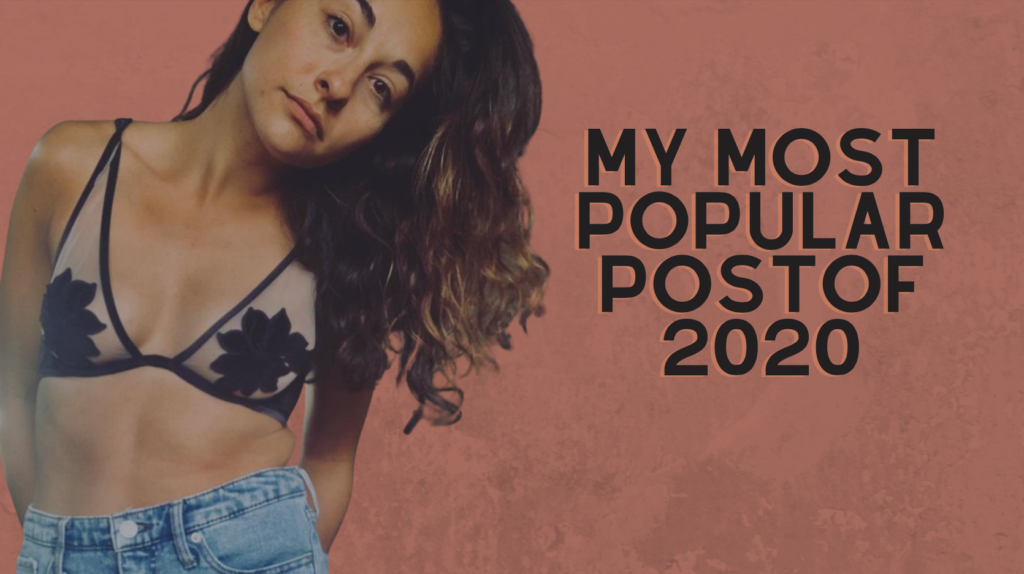
Was it the content? Or was it my boobs?
Dudes spend money on professional photographers to show off their six-packs alongside their posts because that’s the kind of content that gets the most reach. I’m not making assumptions here, they’ve told me.
Mike Robertson didn’t need to show his body for his blog to get a massive reach. His articles were shared all over the internet because of the IMPACT that the content had on coaches.
I’m not judging others for being sucked into this; I am 100 percent guilty of it, too. This article is mostly calling myself out while also encouraging consumers and creators to reflect on what I’m saying.
Around 2019, I stopped blogging consistently and started putting more time into social media, where my following and engagement percentage increased daily. That was a big mistake because I was chasing attention rather than focusing on the work that created the most impact, like my immensely popular “Squat Progression” article.
Success using social media is driven by an algorithm.
The algorithm is formulated by an app that is specifically designed to keep you addicted to your phone.
Let that sink in.
As a creator, do I want to feed into a society that can’t function without social media? Could my time be best spent elsewhere?
As a consumer, do you want to consume information on an app that is designed to keep you addicted? Could your time be best spent elsewhere? How many times have you been unable to make it through an entire caption before you get distracted with scrolling?
Social media content’s intention doesn’t match the impact.
Using Instagram leaves educators with so many constraints that it pushes us to talk about coaching with the following narrative:
If “a” leads to “b” then “w” IS THE ANSWER.
The narrative promotes black and white thinking and feeds into our polarization tendencies. Snarky remarks and calling other modalities out are definitely loved by the algorithm.
With the limited capacity of words, there is zero room for context. You can’t even begin to explain how complex humans actually are with a ten-picture slideshow.
These little snippets of education push coaches’ beliefs concerning pain and movement into single-factor thinking. Movement is explained as if the human body is an algorithmic biomechanical machine.
This single-factor way of thinking causes more harm than good because humans are more than their ribcage structure and compensatory patterns.
Even if the creator’s intent wasn’t to oversimplify the human body and confuse people, that is definitely the impact.
Trust me, most of my mentoring sessions are spent un-fucking people’s confusion about what they’ve learned from social media. And their confusion has come not just from other coaches but even from MY OWN content.
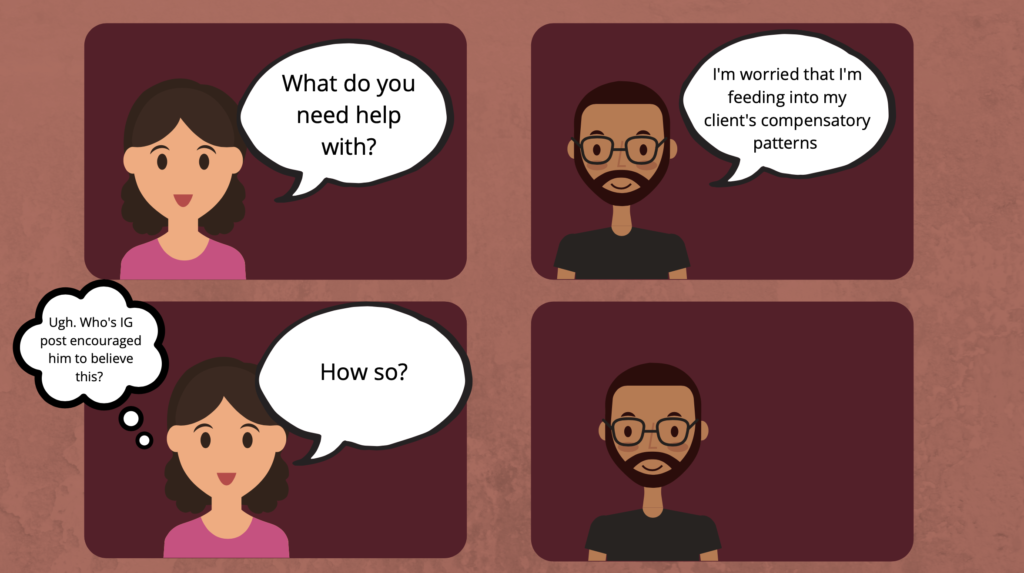
I have to make a decision:
Do I spend HOURS of my free time each week putting together content that is most likely just rubbing people’s intellectual boners rather than helping them?
OR,
Do I use that free time to focus on other things? Should I focus less on educating the masses through social media? Is it more beneficial to focus less on the 400–800 people that quickly look through my stories and more on the 25 that clicked on my 3,000-word blog post and actually read it?
As a social media creator, I don’t know you how you know me.
Having an “internet platform” is weird AF.
When Cooper is sick, people I don’t even know will reach out to me and tell me that they’re thinking of me.
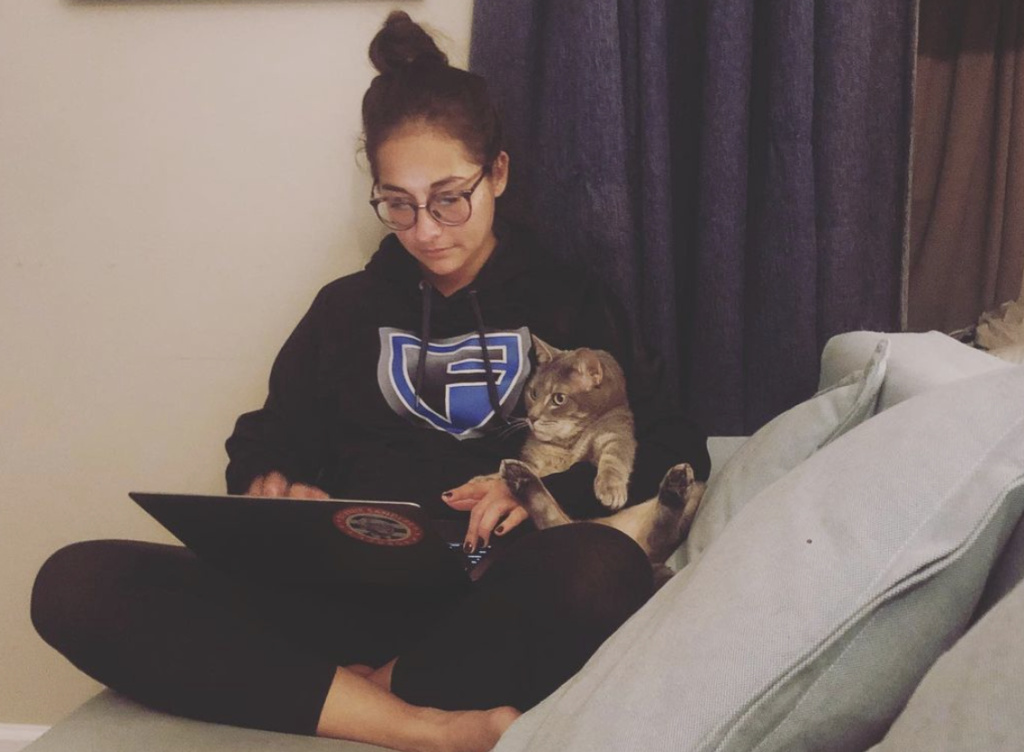
People I don’t know will bring up roadblocks that I overcame four years ago to remind me of my value when I mention that I’m having a hard day.
As much as I LOVE the fact that I get to connect with a bunch of people, it’s still fucking weird.
Social media creates the illusional relationship of the “influencer” and the “follower.” You know everything about an influencer’s life; you connect with them through their content and you FEEL like they’re your friend, but they don’t know shit about you.
I’m not sure how many times is too many times to write the word “weird,” but it’s weird, and it rubs me the wrong way.
The influencer-follower relationship gets to people’s heads, and I’m never allowing myself to go there. Having power and influence changes people, and it’s usually not for the better.
I genuinely want to know the people who are consuming my content.
I want to know about their cats, their side hustles, their job, their struggles, the funny embarrassing things that happen to them, and most importantly, I want to see what I can learn from them.
When you get to know someone on a personal level, there’s always something you can learn from them, and they typically end up being your equal.
Social media makes an authentic relationship hard to come by, which is why I spend time interacting with people “face to face” in my mentoring group rather than only on Instagram. (I’m sorry if I ever ignore and/or forget to DM you back.)
2021 will be the year that I spend less time on Instagram.
I’m changing the way I use social media, and I think you should too. Whether you’re a creator or consumer, we can all do better.
Or, you can disagree with everything that I’ve just said, which you’re 100% allowed to do.
How I will be using my social media:
- To show you my authentic self.
- To push people’s buttons and challenge their thought processes.
- To remind you of my services and blog posts.
- For quick little lessons that I feel don’t need much supplementary context.
- To keep up and connect with the lives of those I care about, especially in the industry. ALL of my best friends have been social media connections.
- Reels, because I’m good at them and I think I’m funny sometimes.
- To share pictures of my cats; especially the one with separation anxiety because you have all developed a soft spot for him.
- For pictures of food because it’s one of my core values, and my foodie friends appreciate them—just like I love seeing their amazing meals.
- To share the thoughts that I’ve spent some time thinking I was the only one but then social media proves me wrong. Much like this one: being really uncomfortable if long sleeves roll up when you put a sweater on.
What I think you should do instead of being glued to social media:
Find one mentor, or mentoring group, and stick with them for a while.
If you’re in multiple mentoring groups but you’re barely participating, constantly attending new online and in-person events, reading one book after another, and going from one social media page to the next all day trying to “learn,” are you taking the necessary time you need to implement what you’re learning?
Probably not.
So, where should you go?
Join my monthly coaching membership
I have a monthly membership where you can be immersed in my gym’s online classes. It’s like an internship that allows you to have a client perspective where you’re required to participate in the class. By signing up, you can be coached by me and my business partner every week.
After being a part-time teacher in an accredited personal training school for over 2 years, I noticed the students who I consistently coached ended up being some of the best coaches.
After each class, I block out 15–30 minutes, where the coaches stay on the Zoom call and the participants get to ask questions. Questions might be about the class they just attended or even a problem that they ran into while coaching.
This program is not only perfect for new-ish coaches who are just joining the industry but also for those who want to build a consistent training model but struggle to implement it with their current clients.
This program is also an AMAZING starting point for those who have been dealing with some chronic pain issues and/or those who have previously been taught about biomechanics and are now scared to lift.
This brings me to my next recommendation:
Learn from Zac Cupples.
I’ve seen Zac teach his model 10 times over the course of 2 years, and IMO, there’s no one better at teaching you about movement than he is.
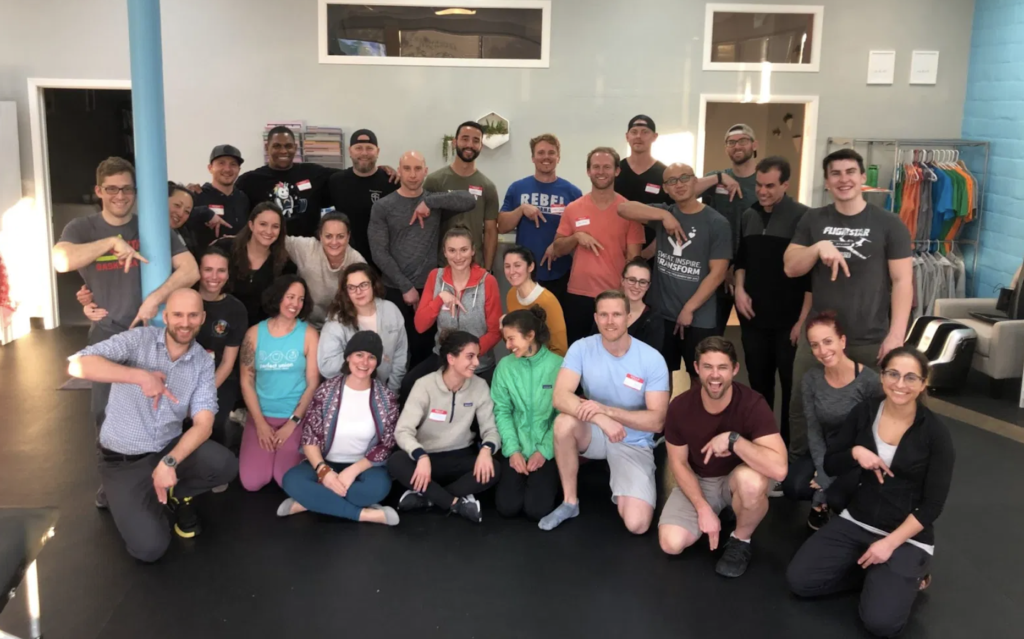
It can be dangerous to teach people about biomechanics.
When not done right, it’s easy to leave people (clients AND coaches) believing they are broken, unable to train because of their compensatory patterns, and down a rabbit hole that they’ll most likely struggle to get out of.
Zac is able to teach you alllll about the human body and will help you dive deep into biomechanics—without being left with the idea that you can’t let yourself (or your clients) lift.
If you’re wanting to dig into how to assess others who work to increase people’s movement options, Zac’s course Human Matrix, alongside his one-on-one mentoring, is a must!
Join Michelle Boland’s group classroom
Enrollment is open for her next group that starts in February!
When in-person seminars were a thing, Michelle and I hosted a few coaching workshops. She was good in all the areas I sucked, which is why I find her so valuable and like to send people in her direction.
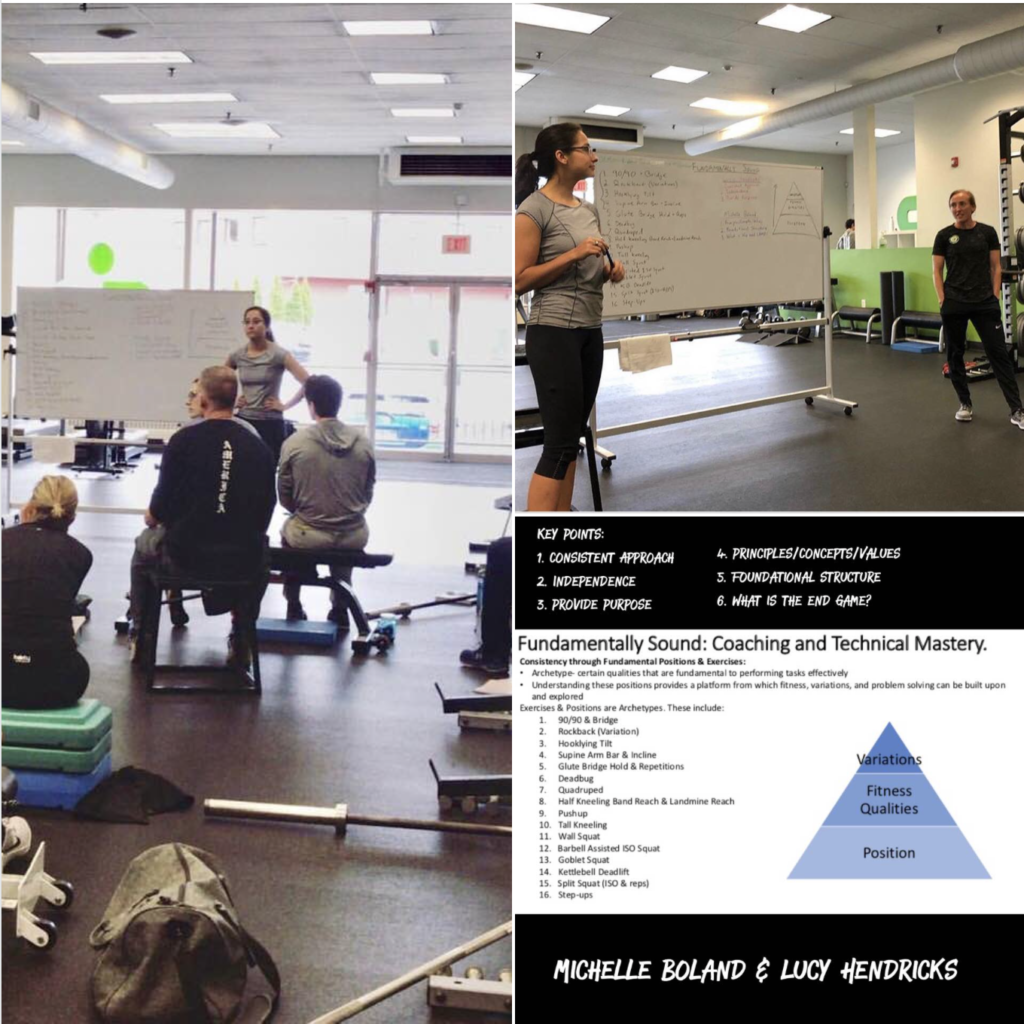
Michelle is the master of building systems and organizing information.
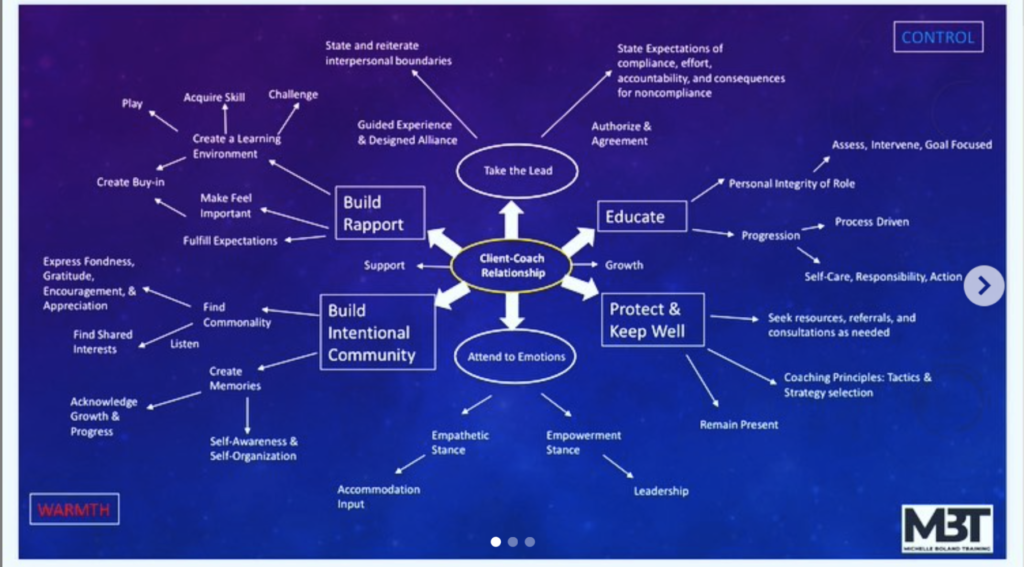
Her mentoring group will help you create your own training principles to guide decision making. She’ll take you through effectively coaching fundamental positions and exercises, and how to create exercises that are based on both intent and the MBT exercise creation model.
She’s the perfect fit if you struggle with taking information and building up your coaching knowledge; Michelle will help you understand what to put on paper.
Whatever you choose, stick with it.
Buying new things and registering for courses don’t automatically make you a better coach. You actually have to do the work and slowly progress by using the information that you’re learning.
In order to be successful with something, you have to fail at it, which I wrote about HERE.
Stop getting distracted with all of the new shiny things if you haven’t gone all-in with the things that you’ve already purchased. Stop thinking that social media is actually educating you when it has nothing to do with making you a better coach.
If you’re struggling to figure out where to get help, book a call with me and if it’s not me, the people I mentioned above, I’ll connect you to the other amazing connections I have 🙂
Comments are closed.
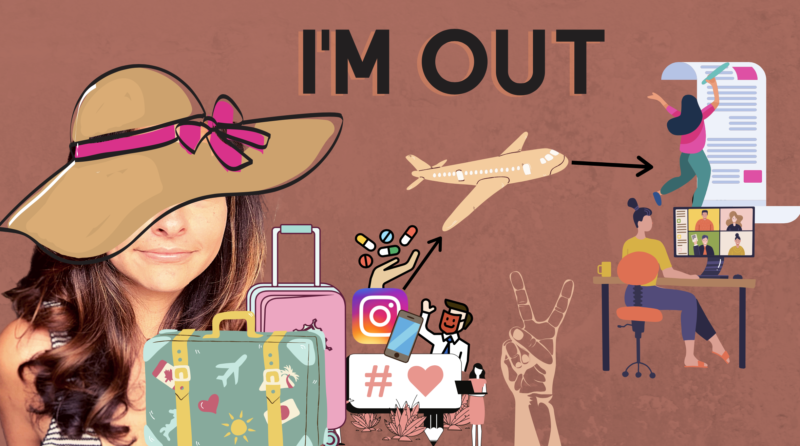
Thanks for sharing. I read many of your blog posts, cool, your blog is very good.
Thank you for your sharing. I am worried that I lack creative ideas. It is your article that makes me full of hope. Thank you. But, I have a question, can you help me?
I don’t think the title of your article matches the content lol. Just kidding, mainly because I had some doubts after reading the article.
Thanks for sharing. I read many of your blog posts, cool, your blog is very good. https://accounts.binance.com/tr/register?ref=JHQQKNKN
Thank you for your sharing. I am worried that I lack creative ideas. It is your article that makes me full of hope. Thank you. But, I have a question, can you help me? https://accounts.binance.com/uk-UA/register?ref=JHQQKNKN
The point of view of your article has taught me a lot, and I already know how to improve the paper on gate.oi, thank you. https://www.gate.io/fr/signup/XwNAU
The point of view of your article has taught me a lot, and I already know how to improve the paper on gate.oi, thank you. https://www.gate.io/zh/signup/XwNAU